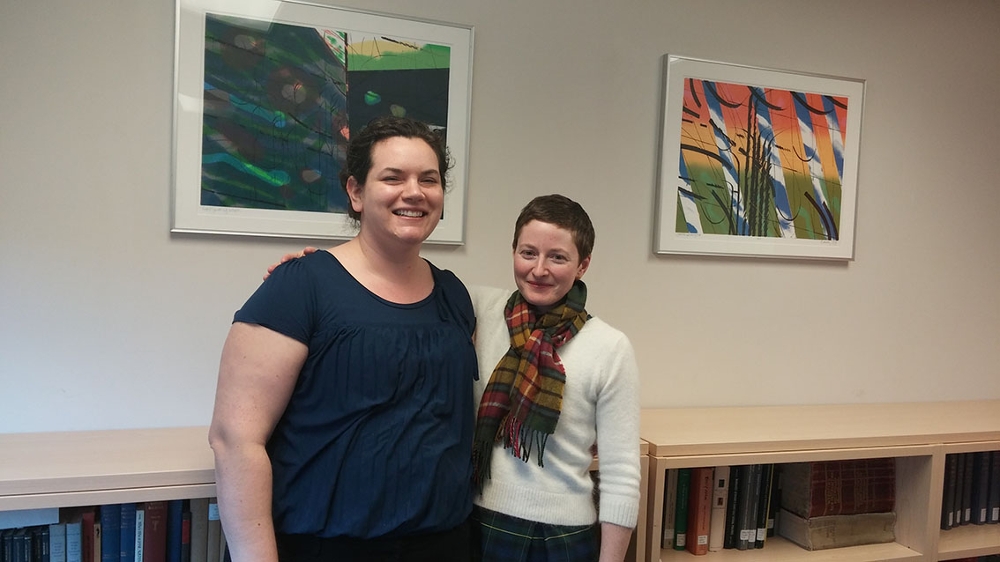English PhD students each win the Hugh Campbell & Marion Alice Scottish Studies Scholarship
Emily Arvay and Caroline Winter, both English Ph.D. students, have been selected to receive the Hugh Campbell & Marion Alice Small Graduate Scholarship for Scottish Studies by the Faculty of Humanities. This impressive annual scholarship of at least $10 000 is given to students with interests in Scotish studies.
Caroline plans to travel to Edinburgh to consult the Adam Smith collection:
"The Hugh Campbell and Marion Alice Small Fund for Scottish Studies Graduate Student Scholarship will support my doctoral research into connections between two genres that emerged in late–eighteenth-century Britain: the economic philosophy of the Scottish Enlightenment and Romantic Gothic literature. My reading of Adam Smith and other economic writings alongside Gothic literature reveals the commonalities of thought in both genres. For example, Romantic-era aesthetic, political, and economic theories frequently use Gothic imagery to describe economic concepts: Smith’s metaphor of the ghostly “invisible hand,” the mechanism by which self-interest is transformed into social good, is the best-known example. The influence of Smith’s writings are clear in relation to Gothic villains, too. Most—perhaps all—are driven by an excess of desire, often the desire for wealth. In the case of Montoni, for example, the iconic villain from Ann Radcliffe’s The Mysteries of Udolpho, his persecution of the novel’s heroine, Emily, is driven by his desire for her family property, to which she is heir. As Mary Poovey argues in “Ideology and 'the Mysteries of Udolpho’,” Montoni is a personification of avarice; he is a distorted, magnified depiction of the dangerous force of self-interest that Smith warned against in Wealth of Nations, a vision of what could happen if the “invisible hand” were to fail or, even worse, were merely a figment of our collective imagination.
My research will make a significant contribution to the field of Scottish studies—and the growing field of Scottish Gothic studies in particular—by presenting for the first time a sustained reading of the Gothic as a literary mode in dialogue with the economic philosophy of the Scottish Enlightenment. It will also contribute innovative readings of canonical and neglected Scottish Gothic texts, including John Moore’s Zeluco, and an examination of Scotland as a site of literary and cultural production." -Caroline Winter
Emily plans to travel to the National Archives of Scotland to expand her research on Will Self's fiction:
"This project, Found or Faked? The Book of Dave and Will Self’s Scottish Conspiracy, contends that The Book of Dave (2006) is not only Will Self’s most ambitious and powerful novel to date but also his most misunderstood. Extant scholarship on The Book of Dave tends to focus on the significance of Self’s contemporary narrative, which unfolds in millennial urban London. To the extent that the novel’s distant future is mentioned at all, it is treated as the defamiliarizing device through which Self achieves his satirization of contemporary life. This research project posits that Self’s reader cannot fully appreciate the political subtleties of the novel’s “recent past” without first identifying the veiled history upon which the novel’s “distant future” is based. This project counters that Self’s “speculative future” is neither speculative nor futuristic but an ironic retelling of a particularly turbulent period in Scotland’s recent past. Though The Book of Dave makes no direct reference to the Scottish Outer Hebrides, this project suggests that Self’s fictive island of “Ham” is painstakingly modeled after Scotland’s exceptionally remote island of Hiort (St Kilda). Significantly, Self’s satiric portrait of Hiort’s demise hinges on an economic conspiracy that respected historians have yet to note: Self insinuates that Hiort’s landlord, missionary priest, rent-collector, and governor are working in concert to trick the Hiortans into accepting that popular demand for their oil had waned and that it is in their best interest to export mass quantities cheaply. Having established the contours of Self’s conspiracy, this project concludes that Self’s dramatization of Hiort’s collapse draws the reader’s attention to the conspiratorial dimensions of the OPEC oil crises of 1973 and 1979. Receipt of this award will enable me to consult the National Archives of Scotland to determine whether Self’s Scottish conspiracy is merely the author’s flight of fancy or an astute conclusion confirmed by archival evidence" -Emily Arvay

